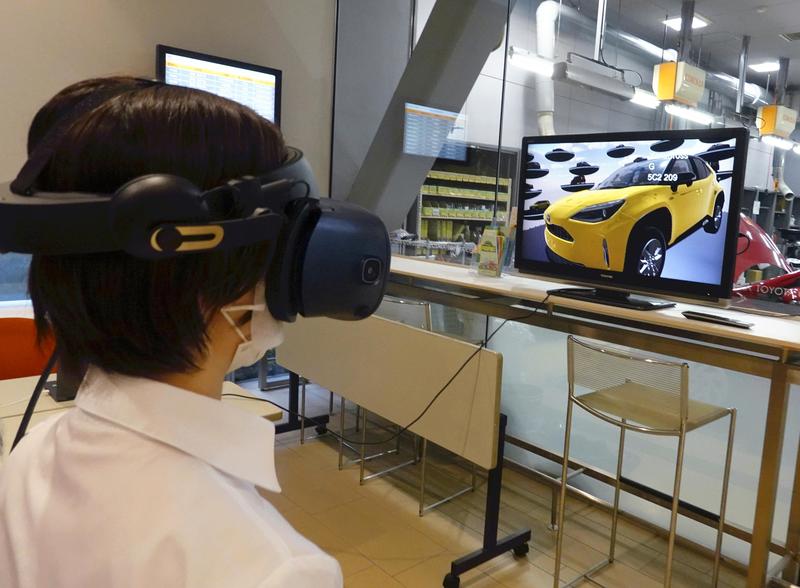
Japan's automobile showroom culture is in the midst of a revolution, with virtual reality and artificial intelligence, and the novel coronavirus shaking things up like never before.
With VR tech, customers are "put" in the driver's seat and can interact at scale with the interiors of more than 1,000 automobile models and color combinations -- something out of the question when it comes to brochures and catalogs.
"How about this color?" asked a staff member to a customer wearing a VR headset in the showroom of a Toyota-affiliated dealership in Osaka.
Until recently, Toyota's dealerships were typically divided into four groups that sold different makes and models in the automotive giant's line-up. But since May, all Toyota dealerships have been able to sell all models. As some dealerships cannot accommodate a wide variety of models due to space limitations, VR has been a welcome option.
"A lot of families find it appealing, like a game," said the general manager of the sales division at Toyota Shin-Osaka Sales Holdings. Another point working in VR's favor is that some customers don't want to ride in cars that have been previously touched because they want to prevent the spread of novel coronavirus infections. The implementation of the next-gen tech has been a welcome concept thus far with a 10% year-on-year increase in orders at VR-enabled dealerships.
--Online sales accelerate
The novel coronavirus has altered the automotive industry's traditional face-to-face sales with a shift to improving the customer's shopping experience online.
In September, the Japanese unit of Germany's BMW AG sold 7 cars exclusively online. Despite a price tag of more than 18 million yen, they all sold in 3 minutes.
The company launched an online store in July, enabling customers to complete a wide range of procedures, from purchases to arranging delivery. "The demand was higher than expected," a company spokesman said.
Meanwhile, Toyota has added an online negotiation function to its My TOYOTA member site. Customers are required to pay at a physical shop, but by using the website they are able to reduce the number of trips and time spent in showrooms.
According to Toyota's directly managed sales company Toyota Mobility Tokyo, as of the end of September, a total of 311 online negotiations had been held, resulting in 150 sales. "Customer service at the site is the most important, but we are dealing with a wider frontier," said a manager of the firm's Nerima Kitamachi store.
Nissan Motor Co.'s Click Mobi service, which launched in March, allows customers to complete the entire procedure from purchase to delivery on the internet without having to step foot in a dealership. It is available across 32 prefectures and customers can chat online with staff or find out trade-in prices simply by sending in three photos of their vehicles.
Sales of automobiles conducted online are not covered by a cooling-off period and the purchased vehicle cannot be returned after the contract has been signed. However, each company offers test driving and online purchasing consultations. Their aim is to sell in a manner that maintains a high standard of customer satisfaction.
--AI-backed sales
IDOM Inc., the operator of used-car dealer Gulliver, launched a "drive-through assessment" system at its Takamatsu Chuo-dori store in April. An automobile's purchasing price can be determined without customers facing staff during a test drive, making it about as simple as ordering a hamburger and fries at a fast-food drive-through.
The company's AI system is able to set the price in about 3 minutes while the customer interacts via microphone with staff at the assessment station in the front of the store. A monitor displays the details of the deal and a QR code, which customers can scan with a smartphone to save the information.
--New habits, new research, new times
Some phenomena in the auto-world seem to be sticking around. Such is the case for the many notification and registration procedures that are mandatorily undertaken after the purchase of an automobile. Regular maintenance and inspections are not only essential but are also accompanied by a bewildering array of schemes. Another perennial fixture are the salespeople who build their client lists over time via word-of-mouth recommendations that help to attract the friends and family members of their regular customers.
However, such traditional ways of car dealing have been changing.
According to research compiled by the Japan Automobile Dealers Association on automobile dealers in 2019, about 60% of non-car owners in their 20s and 30s said in a survey that entering a dealership was difficult for them. And 36% said an unmanned showroom was preferred -- 13 percentage points higher than those who said they would rather go to a standard showroom with sales staff potentially inside.
A dealer said of the changing times, "There is now an increasing number of cases where customers don't buy cars even though they came to our showrooms through an introduction."
U.S. automaker General Motors Corp. introduced online car sales in 2013. Online sales of cars are ahead in Europe, the U.S. and China. According to Frost & Sullivan, a U.S. research firm, online sales as a percentage of total car sales accounted for 1% in 2018, and by 2025, it is predicted to soar above 5%, or about 6 million cars.
"In Japan, the majority of sales are made when people upgrade from their old cars. Whether companies can close deals online will be the key challenge for adoption," automotive critic Yoichiro Watanabe said.
Read more from The Japan News at https://japannews.yomiuri.co.jp/







